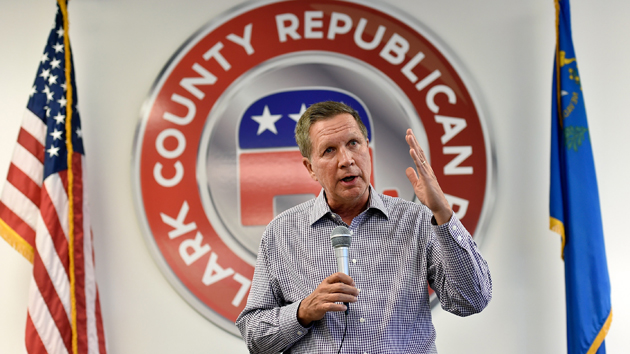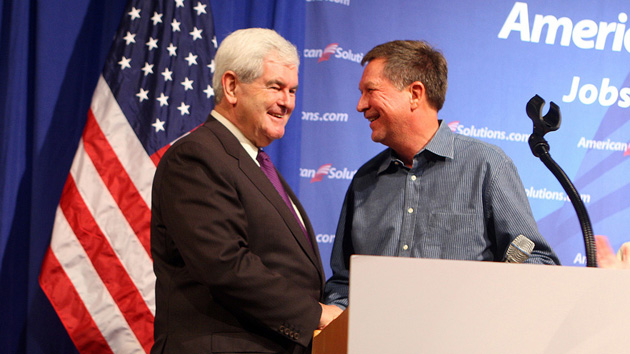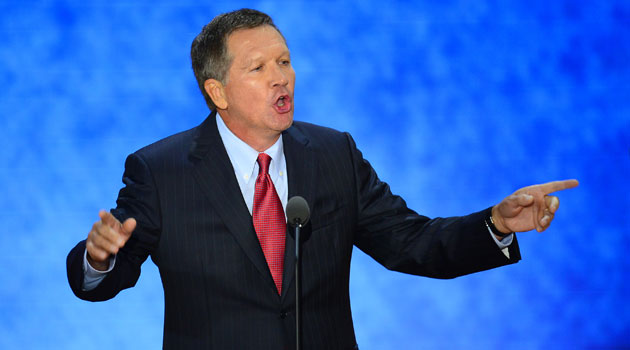John Kasich, the Republican governor of Ohio, is announcing his bid for the presidency Tuesday. Unlike most of his GOP opponents, Kasich actually believes that climate change is real.
“I happen to believe there is a problem with climate change,” he told the Hill in 2012. “I don’t want to overreact to it, I can’t measure it all, but I respect the creation that the Lord has given us and I want to make sure we protect it.” He made a similar statement in the video above, taken at a conference last month, but he added that the environment shouldn’t be “worshipped,” because that would be “pantheism.”
Despite his comparatively reasonable views on climate science, Kasich has been pretty noncommittal about actually addressing global warming. And over the last few months, he has stepped up his opposition to President Barack Obama’s climate agenda. He’s rolled back Ohio’s clean energy goals and has joined a legal challenge against the Environmental Protection Agency.
“Gov. Kasich seems less extreme than some other presidential candidates because he couches his views on climate change with uncertainty, rather than disagreement,” said Dan Weiss, a senior vice president at the League of Conservation Voters. Still, Weiss said, Kasich’s record tells a different story.
It’s no surprise that climate change would be on Kasich’s radar. His state is a leading producer and user of coal, which is the country’s top source of carbon dioxide pollution. Kasich has said he is “not going to apologize” for burning coal. He’s also been a proponent of so-called “clean coal” technology, which aims to capture carbon emissions and store or repurpose them. (So far there’s only one commercial-scale CCS project in the country, at an astronomically expensive coal plant in Mississippi.) In the video above, Kasich claimed that his state “reduced emissions by 30 percent over the last 10 years.” According to federal data, total carbon emissions in Ohio fell only about half that amount between 2002 and 2012. (Rob Nichols, Gov. Kasich’s spokesperson, did not return multiple requests for comment about this statement and the governor’s overall climate record.)
Either way, Ohio’s energy sector is among the nation’s dirtiest. It ranks fifth nationwide for total carbon emissions and has one of the nation’s highest rates of carbon emissions per unit of energy produced, a measurement that experts refer to as “carbon intensity.” That’s because of the state’s heavy reliance on coal, which provides 63 percent of its electricity (as opposed to just 2 percent from renewables). And Ohio is home to American Electric Power, one of the country’s biggest power companies and the number-two producer of electricity-related carbon emissions.
The upshot of those statistics is that if the United States is going to “protect” the Earth, as Kasich claims to want to do, Ohio clearly has an important role to play. And yet, Kasich’s administration has been a leading opponent of Obama’s Clean Power Plan, a slate of regulations for power-related emissions that aims to reduce the nation’s carbon footprint 30 percent by 2030 and that forms the backbone of the president’s climate agenda. The rules, which set a different targets for each state, treat Ohio relatively lightly—according to a Bloomberg analysis, Ohio would be required to reduce its carbon intensity, but its overall carbon emissions could remain more or less unchanged. Last year, the Ohio EPA called the proposed rules “flawed” and said the federal EPA had “radically underestimated” their cost. Meanwhile, Ohio Attorney General Michael DeWine joined with a dozen other states in asking a federal court to block the EPA from implementing the plan. The court ultimately declined to hear that challenge, as the rules haven’t yet been finalized.
Ohio may have a difficult time meeting the EPA target anyway, thanks to a law Kasich signed last year that effectively shelves the state’s own clean energy targets. The measure, which was backed by the conservative American Legislative Exchange Council, puts a two-year freeze on requirements for power companies in the state to procure more of their electricity from renewable sources like wind and solar, and to reduce energy demand overall. Clean energy targets like that would have helped the state meet the EPA mandate in a cost-effective manner; without them, the state may have to rely more heavily on curbing its coal use, according to one clean energy industry group in the state.
So while Kasich might seem like a moderate on climate, undermining climate-friendly policies is hardly better than opposing the science outright. The quest for a climate-savvy GOP candidate continues.












